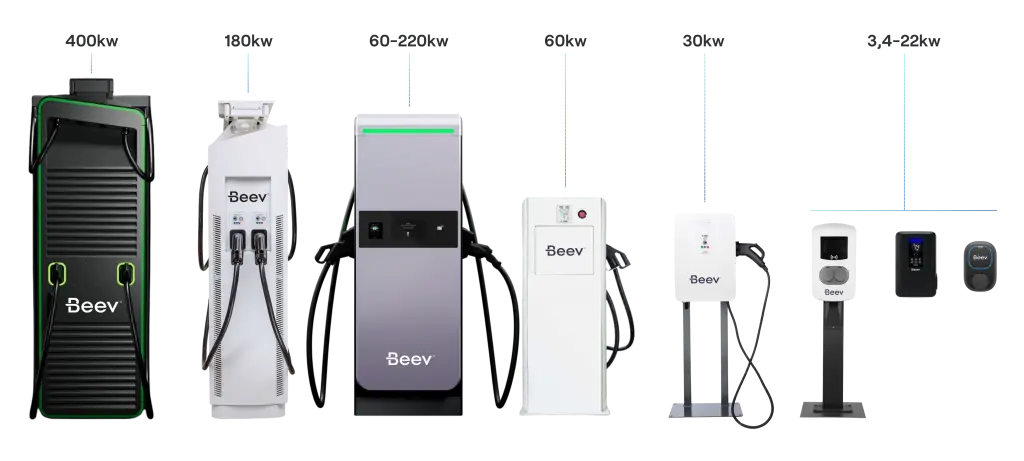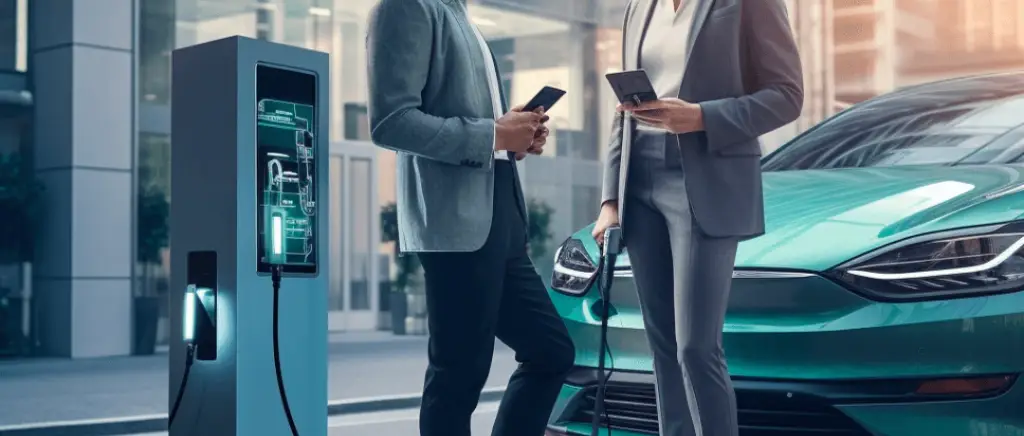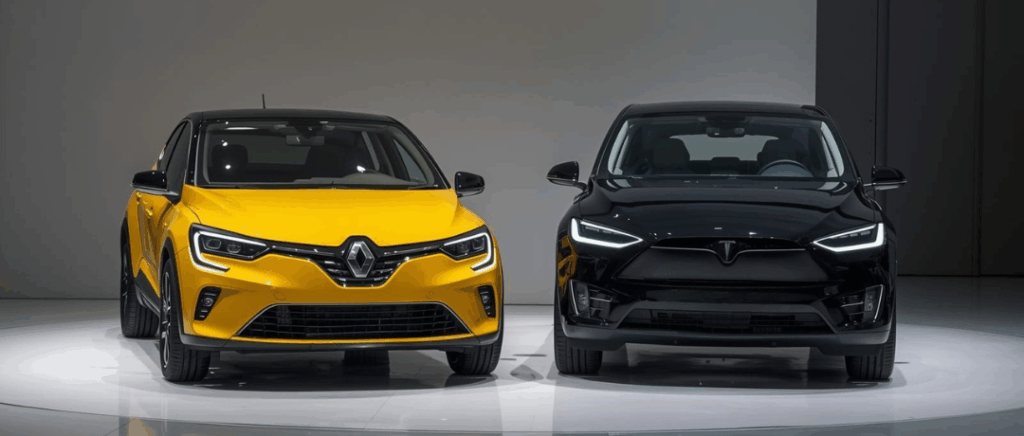Why is it strategic to invest in charging points for an electric fleet?
What are the long-term economic benefits for businesses?
The long-term economic benefits for businesses are significant. The adoption of electric vehicles can reduce the total cost of ownership (TCO) by 15 to 20% compared with combustion vehicles. Companies benefit from lower fuel costs, lower maintenance costs and vehicle tax exemptions or reductions.
What's more, the charging stations offer an excellent return on investment (ROI) through long-term savings. Businesses can also take advantage of tax benefits such as tax credits, reduced VAT and support programmes such as the Advenir bonus.
Electric vehicles offer significant economic advantages over combustion engine vehicles. According to theAmerican Automobile Association (AAA)maintenance costs for electric vehicles are 30 to 40 % lower than petrol or diesel models, thanks to simpler mechanics and the absence of parts subject to wear and tear, such as clutches or exhaust systems. What's more, the cost of recharging an electric vehicle is on average 2 to 3 times lower than that of fuel for a thermal vehicle.
In practical terms, recharging an electric vehicle costs around 0.10 to 0.15 €/kmagainst 0.20 to 0.30 €/km for a petrol or diesel vehicle. These savings, accumulated over the life of a fleet, represent a substantial financial gain for companies.
To illustrate in practical terms the profitability of electric vehicles for a company, let's take the example of a service company with a fleet of 50 vehicles, each travelling an average of 30,000 km a year.
5-year cost comparison

Internal combustion cars
- Average purchase cost: €25,000 per vehicle
- Fuel: €0.25/km x 30,000 km x 5 years = €37,500 per vehicle
- Maintenance: €2,000 per year x 5 years = €10,000 per vehicle
- TVS: €1,000 per year x 5 years = €5,000 per vehicle
- Total over 5 years per vehicle: €77,500
- Total for 50 vehicles: €3,875,000
Electric cars
- Average purchase cost: €35,000 per vehicle
- Recharging: €0.12/km x 30,000 km x 5 years = €18,000 per vehicle
- Maintenance: €1,200 per year x 5 years = €6,000 per vehicle
- TVS: Total exemption = €0
- Total over 5 years per vehicle: €59,000
- Total for 50 vehicles: €2,950,000
Savings
- Total savings over 5 years: €3,875,000 - €2,950,000 = €925,000
- Savings per vehicle: €18,500
- Percentage savings: 23.87%
In conclusion, despite a higher initial investment, the adoption of electric vehicles has enabled this company to achieve substantial savings of €925,000 over 5 years, representing a reduction in total cost of ownership of almost 24%. These figures clearly demonstrate the long-term profitability of the transition to an electric fleet, not to mention the added tax and image benefits.
How do charging points improve the operational efficiency of electric fleets?
Charging stations considerably enhance the operational efficiency of electric fleets. They significantly reduce business interruptions by cutting vehicle recharging times. Drivers can recharge their vehicles during breaks or between missions, optimising working hours and avoiding the loss of productivity associated with long waits.
What's more, the automated management of fast-charging stations provides precise monitoring of charging operations, simplifying administrative work and the planning of technical interventions. This flexibility and efficiency means that businesses can adapt their infrastructure to meet changing needs, guaranteeing optimum continuity of service.
Financial aid and incentives for the installation of charging points for professionals
What grants and tax credits are available to businesses?
The grants and tax credits available to businesses wishing to install electric charging points have changed in 2025. Although the ADVENIR scheme for company car parks not open to the public was abolished in 2023, some grants are still available.
Companies can benefit from regional subsidies, as in the Grand Est and Normandy regions, which cover up to 50% of installation costs, with ceilings varying between €1,000 and €3,000 per terminal depending on the project.
What's more, a reduced VAT rate of 5.5% on charging infrastructure is still in force, helping to reduce overall installation costs.
How can you optimise the cost of installation thanks to government programmes?
To optimise the cost of installation through government schemes, companies can combine several approaches. Firstly, they need to find out about the specific support available in their region, as some local authorities offer additional subsidies.
Next, it is important to choose charging points that comply with current standards if you are to be eligible for existing grants. Companies can also consider opening their car parks to the public to benefit from higher rates of aid, as shown in the table of ADVENIR incentives for car service professionals.
Finally, by planning the installation of charging points as part of an overall energy transition strategy, businesses can not only reduce their costs in the long term, but also comply with the legal obligations that will become more stringent in 2025, thereby avoiding possible financial penalties.
Types of recharging point: which solutions for your electric fleet?
Differences between rapid, semi-rapid and domestic terminals for professionals

There are three main categories of charging points for professionals: fast, semi-fast and domestic, each adapted to specific needs. Fast chargers, which deliver more than 50 kW of DC power, are ideal for fleets that need to rotate frequently, such as taxis or delivery vehicles.
Semi-rapid charging stations, with an AC output of 22 kW, offer a good compromise between charging speed and installation cost, making them suitable for vehicles parked for several hours.
Domestic charging points, with a power rating of 3.7 to 7.4 kW, are suitable for company vehicles parked overnight or during the day.
Read our article: Which fast-charging station should I choose for my business?
How do you choose the right charging point for the size and needs of your fleet?

There are a number of factors to consider when choosing a recharging point to suit the size and needs of your fleet. It's important to assess the number of vehicles to be recharged, their charging capacity and usage patterns.
For a large fleet with vehicles that rotate frequently, fast or semi-rapid charging stations will be required.
For vehicles parked for long periods, domestic charging points may suffice. It is also important to consider the future development of the fleet and to plan for a scalable infrastructure. A detailed analysis of requirements, including parking times, distances travelled and battery capacities, will help determine the optimum combination of charging points for your business.
Profitability and return on investment: a winning choice for businesses
What is the average time needed to make the installation of a charging point profitable?
The average payback period for the installation of a charging point in a company generally varies between 2 and 5 years, depending on use and the specific context. This estimate takes into account savings on fuel costs, reduced maintenance costs for electric vehicles, and potential tax benefits.
For a charging point used intensively, the return on investment can be faster, sometimes in less than 2 years. Factors influencing this timeframe include the initial cost of installation, the electricity tariff, the frequency of use of the charging point, and any subsidies obtained. It is important to note that profitability improves over time, as the operating costs of electric vehicles continue to fall compared with combustion vehicles.
The average time taken to make the installation of a charging point profitable varies according to a number of factors, but here's a concrete example to illustrate:
Let's take the case of a company installing a charging point for its fleet of electric vehicles:
- Cost of installing the terminal: €2,500
- Bonus received: €750
- Net cost of installation: €1,750
Comparison of annual costs :
- Electric recharge: €198 per year
- Fossil fuel equivalent: €720 per year
- Annual savings: €522
In this scenario, the return on investment would be achieved after the third year of use. More specifically:
Year 1: -€1,750 + €522 = -€1,228
Year 2: -€1,228 + €522 = -€706
Year 3: -€706 + €522 = -€184
Year 4: -€184 + €522 = €338 (profitability achieved)
It is important to note that profitability can be achieved more quickly in certain cases:
- For companies that use terminals intensively
- When combined with renewable energy systems such as solar power
- If the company monetises its terminal by making it accessible to the public
What's more, the tax benefits and savings on electric vehicle maintenance can further accelerate the return on investment.
Charging stations, an asset for your company's image
How can the adoption of charging points enhance your commitment to the environment?
Adopting charging points for electric vehicles can considerably enhance a company's commitment to the environment in a number of ways:
| Aspect | Description |
|---|---|
| Concrete commitment | Installation of charging stations demonstrates tangible action in favour of the energy transition and sustainable mobility |
| Strengthening CSR | Is part of a Corporate Social Responsibility approach, demonstrating a commitment to the well-being of employees and the environment |
| Enhanced brand image | Positive perception as a responsible company, attracting customers and partners who share the same environmental values |
| Reduction incarbon footprint | Facilitates the use of electric vehicles, actively contributing to the reduction of CO2 emissions |
| Environmental certifications | Can help you to obtain property certifications such as BREEAM or LEED, which promote ecological commitments |
| Regulatory anticipation | Positions the company ahead of future environmental regulations, demonstrating its proactivity |
Conclusion
In conclusion, investing in charging points for an electric fleet is a strategic and profitable choice for businesses. Although the initial investment may seem substantial, the savings made on fuel, maintenance and tax benefits mean a rapid return on investment, often in less than five years. What's more, these infrastructures improve the operational efficiency of fleets, reduce business interruptions and enhance the company's image by affirming its commitment to the environment.
At a time when the energy transition is becoming a necessity, the adoption of recharging points seems like a sustainable decision, reconciling economic profitability and environmental responsibility.
If you're a professional or a company and you want to go electric or develop your electric fleet, whether for the purchase of electric vehicles or the installation of charging stations, Beev is here to help you with your project.































